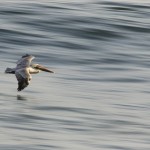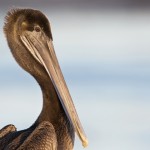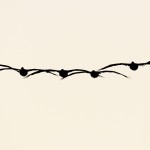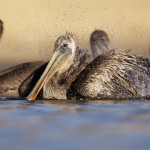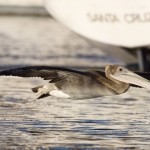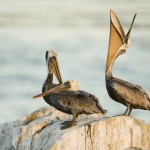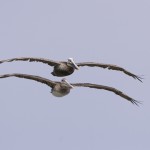Location: Santa Cruz, California
Price: $500
Deposit: $200
Maximum Number of Participants: 4
Brown Pelicans used to be on the endangered species list, now their numbers are over 200,000 individuals. These prehistoric looking birds grace our coastline in healthy numbers every spring and summer. Along with their quirky (though beautiful) looks, they offer us many glimpses into their amazing lives. During this trip we will focus on capturing these animals as they fly over the water, roost on coastal rocks and engage in behaviors such as bathing, preening, plunge-diving, and head throws. By utilizing a few different locations we will maximize our opportunities.
Required Photo Equipment:
– Camera (Digital SLR Camera preferred)
– Telephoto Lens (200 and above is recommended, 400 through 800mm range is best) *
Optional Photo Equipment:
– Wide angle lens
– Monopod/Tripod (or bean bag)
– Teleconverters
– Flash
– Better Beamer
– Graduated Neutral Density Filters
– Remote Trigger
– Flashlight
What to Bring
Clothing: California has a Mediterranean climate which means that the mornings are rather cold while the afternoons get hot. This means its best to wear lots of layers that can be taken on and off during the day. Also bring a rain jacket and rain pants if you have them. If you are prone to getting cold, you may want to bring a beanie and gloves (and hand warmers).
Shoes: Running shoes.
Camera Gear Protection: I will have rubbing alcohol and paper towels to wipe down cameras and lenses after exposure to salt water.
Learning Materials: A computer (also good for downloading images) and/or a notepad will be good to take notes with.
Travel: Fly into San Jose airport, where you can rent a car. Look for hotels on the west side of Santa Cruz.
Accommodations: Are not included in the workshop fee. Please ask me if you have questions about where to stay.
Food: There are lots of supermarkets and restaurants in the area. Food is also not included in the workshop fee.
Transportation: There will be limited driving on this trip. Ask about getting a ride with me in my car during the workshop, but you would still be responsible for getting to and from the airport.
Schedule: We will meet at a location around 5:30am and then shoot until the light is too harsh or if all of us are exhausted. After that we will have an afternoon break with learning opportunities and free time. We will then go out for a sunset photographic session which will end around 9:00pm. (Sunrise is at 5:55am and Sunset is at 8:15pm). During the entire time, I will be available for one-on-one instructions.
Physical Requirements: All of our shooting locations will be less than a mile from the car, the terrain will mostly be easy to walk on (concrete, beach) but we may at one point walk over slippery coastal rocks.
If you arrive prior to workshop start time: I will be available to meet people for dinner on the Thursday before the workshop starts, but will otherwise be engaged with location scouting.
What’s included in the price: Services of Sebastian Kennerknecht as photographic guide which includes knowing the area, having extensive natural history knowledge of the local fauna (especially the pelicans), helping you with any special needs, and helping you create more interesting and unique pictures of these seabirds.
What’s not included in the price: Flights and other travel to and from the location, accommodations, meals, and anything not listed in the “What’s included in the price” list above.
Possible Species List (underlined species are the most commonly seen):
Brown Pelican (Pelecanus occidentalis,)
Brandt’s Cormorant (Phalacrocorax penicillatus)
Great Egret (Ardea alba)
Western Gull (Larus occidentalis)
Sooty Shearwater (Puffinus griseus)
Double-crested Cormorant (Phalacrocorax auritus)
Elegant Tern (Sterna elegans)
Snowy Egret (Egretta thula)
Black Oystercatcher (Haematopus bachmani)
Willet (Tringa semipalmata)
Marbled Godwit (Limosa fedoa)
Common Murre (Uria aalge)
Pigeon Guillemot (Cepphus columba)
Heermann’s Gull (Larus heermanni)
California Gull (Larus californicus)
Caspian Tern (Sterna caspia)
[contact-form-7 id=”2046″ title=”Workshop Signup”]

